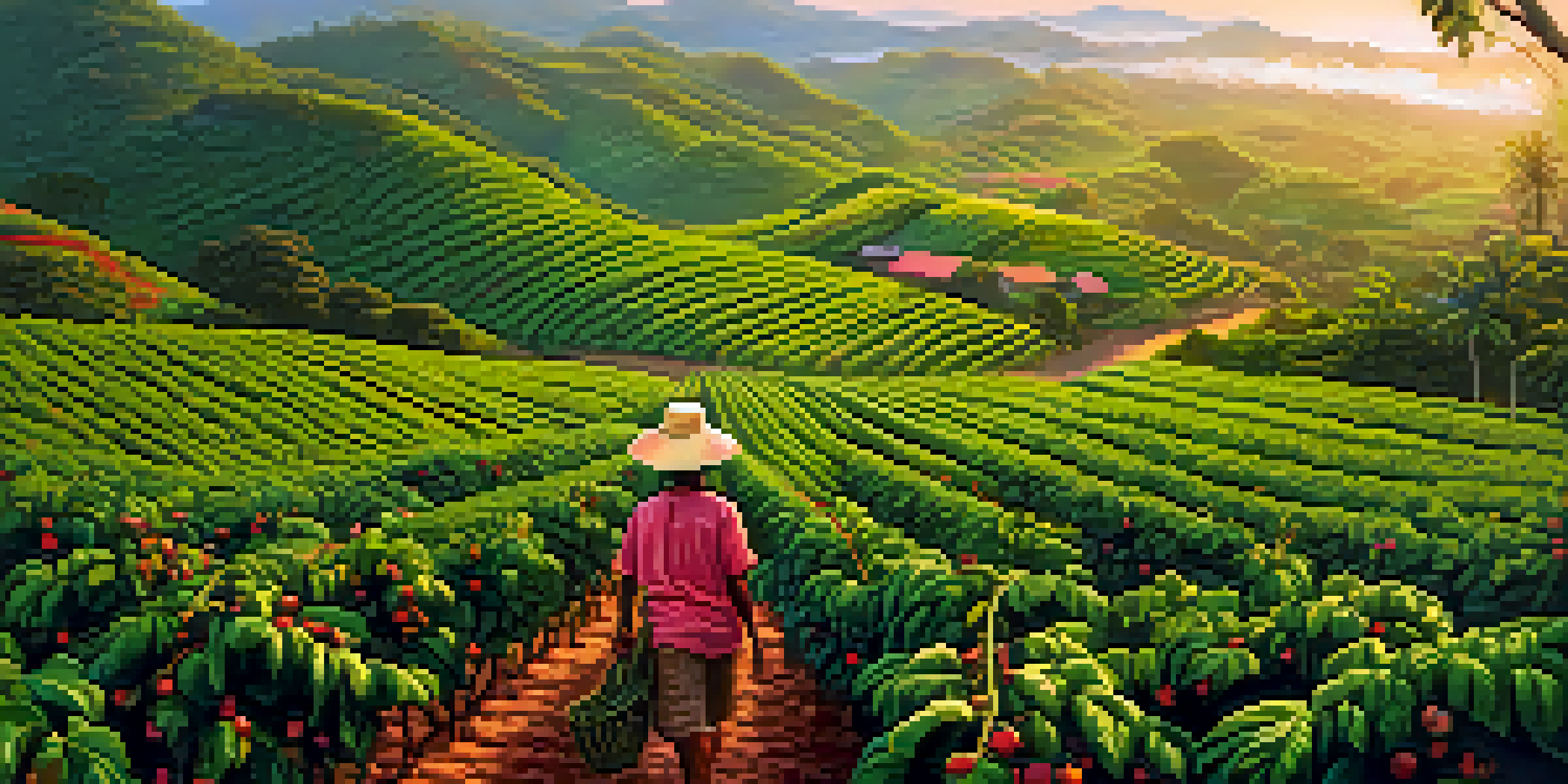The Coffee Trail: Journey through Brazil's Coffee Heritage

An Introduction to Brazil's Coffee Culture
Brazil is not just a country; it's a coffee lover's paradise. Known as the largest coffee producer in the world, Brazil has a rich and diverse coffee culture that dates back to the 18th century. With its unique climatic conditions and varied terrains, Brazil offers an ideal environment for growing coffee beans of exceptional quality.
Coffee is a language in itself.
As you embark on this journey through Brazil's coffee heritage, you'll discover the deep-rooted traditions and innovative practices that shape its coffee industry today. From the bustling coffee farms in Minas Gerais to the vibrant cafés in São Paulo, Brazil’s coffee scene is a delightful blend of history, culture, and community.
This exploration will take you through various regions, each with its distinct flavors and brewing techniques. So grab your favorite mug and get ready to savor the rich stories behind every cup of Brazilian coffee.
The Roots of Coffee Cultivation in Brazil
The journey of coffee in Brazil began in the early 18th century when coffee plants were brought from French Guiana. Initially cultivated as an ornamental plant, it quickly gained popularity and became a lucrative agricultural product. Over the decades, Brazil's favorable climate and fertile soil enabled coffee to flourish, leading to its status as a global powerhouse.

In the 19th century, the coffee boom transformed Brazil’s economy, leading to the establishment of vast plantations. The growth of the coffee industry also significantly impacted the country’s social fabric, with many immigrants arriving to work on the farms. This blend of cultures contributed to the unique coffee traditions we see today.
Brazil's Cultural Coffee Heritage
Brazil's coffee culture, rooted in history, showcases a blend of tradition and innovation that defines its global coffee industry.
Understanding the historical context of coffee cultivation in Brazil helps us appreciate the craftsmanship and dedication that go into every bean. It's a journey that reflects not just agricultural practices but also the resilience and creativity of the Brazilian people.
Exploring the Varied Coffee Regions of Brazil
Brazil boasts a diverse range of coffee-growing regions, each contributing unique flavors to the beans. One of the most famous is Minas Gerais, known for its smooth, chocolatey profiles. The region's rich volcanic soil and varied altitude create perfect conditions for growing high-quality coffee.
Life is too short to drink bad coffee.
Another notable area is São Paulo, where the bustling coffee culture thrives in urban cafés. Here, baristas experiment with brewing techniques, showcasing the versatility of Brazilian coffee. From espresso to pour-over, the creativity in the coffee scene is a testament to Brazil's innovative spirit.
Finally, we can't overlook the Cerrado region, which is recognized for its nutty and fruity coffee flavors. Each region tells its own story, shaped by the local climate, soil, and traditions, making Brazil a treasure trove of coffee experiences waiting to be explored.
The Art of Coffee Processing in Brazil
Once harvested, coffee beans undergo a meticulous processing method that greatly influences their flavor. In Brazil, two primary methods are utilized: natural and washed. The natural process involves drying whole cherries in the sun, which imparts fruity notes, while the washed process removes the fruit before drying, resulting in cleaner, brighter flavors.
This attention to detail in processing is a labor of love for many Brazilian farmers. They often rely on traditional techniques passed down through generations, ensuring that the quality and taste remain consistent. The care taken during processing is what sets Brazilian coffee apart on the global stage.
Diverse Coffee Regions and Flavors
Each coffee-growing region in Brazil, from Minas Gerais to São Paulo, contributes unique flavors and brewing techniques to the coffee experience.
Moreover, advancements in technology and sustainable practices are being integrated into coffee processing, further enhancing the quality and environmental impact of the industry. This blend of tradition and innovation is what makes Brazilian coffee processing truly unique.
Brewing Techniques: Savoring Brazilian Coffee
When it comes to brewing Brazilian coffee, there’s no one-size-fits-all approach; the method can greatly affect the flavor profile. Popular techniques include the traditional Brazilian coffee pot, or ‘cafézinho’, which produces a strong and sweet brew. This method is often enjoyed throughout the day as a social ritual.
Other methods, like the French press or pour-over, allow for a different exploration of the coffee's flavors. The choice of brewing technique can highlight the unique characteristics of beans from different regions, making it an exciting adventure for coffee enthusiasts.
Experimenting with various brewing methods not only enhances your appreciation of Brazilian coffee but also opens the door to discovering your personal preferences. So, whether you like it strong or smooth, there's a Brazilian brew waiting just for you.
The Role of Sustainability in Brazilian Coffee
As the coffee industry evolves, sustainability has become a crucial focus for many Brazilian farmers. With the impacts of climate change becoming increasingly evident, many are adopting eco-friendly practices that prioritize the health of the environment. This includes using organic farming methods and engaging in reforestation efforts.
Sustainable practices not only benefit the planet but also enhance the quality of the coffee. Healthier ecosystems lead to healthier coffee plants, resulting in beans with richer flavors. This commitment to sustainability is gaining recognition and is an essential part of Brazil's coffee narrative.
Sustainability in Coffee Production
Brazilian coffee producers are increasingly adopting sustainable practices to combat climate change while enhancing the quality of their beans.
Moreover, consumers today are more conscious of their coffee choices, often seeking ethically sourced products. By choosing Brazilian coffee that prioritizes sustainability, you support farmers who are dedicated to preserving the land for future generations while enjoying some of the finest coffee in the world.
The Future of Coffee in Brazil
As we look ahead, the future of coffee in Brazil is filled with promise and potential. The industry is increasingly embracing technology, from precision agriculture to innovative brewing methods. These advancements are helping farmers optimize their yields while maintaining the quality that Brazilian coffee is known for.
Additionally, the younger generation of coffee producers is eager to experiment with new flavors and blends, pushing the boundaries of traditional coffee. This fresh perspective not only invigorates the industry but also attracts a new wave of coffee enthusiasts eager to explore Brazil’s offerings.

However, challenges such as climate change and market fluctuations remain. By focusing on sustainability and innovation, Brazilian coffee producers are well-positioned to navigate these obstacles and continue to share their rich heritage with the world.